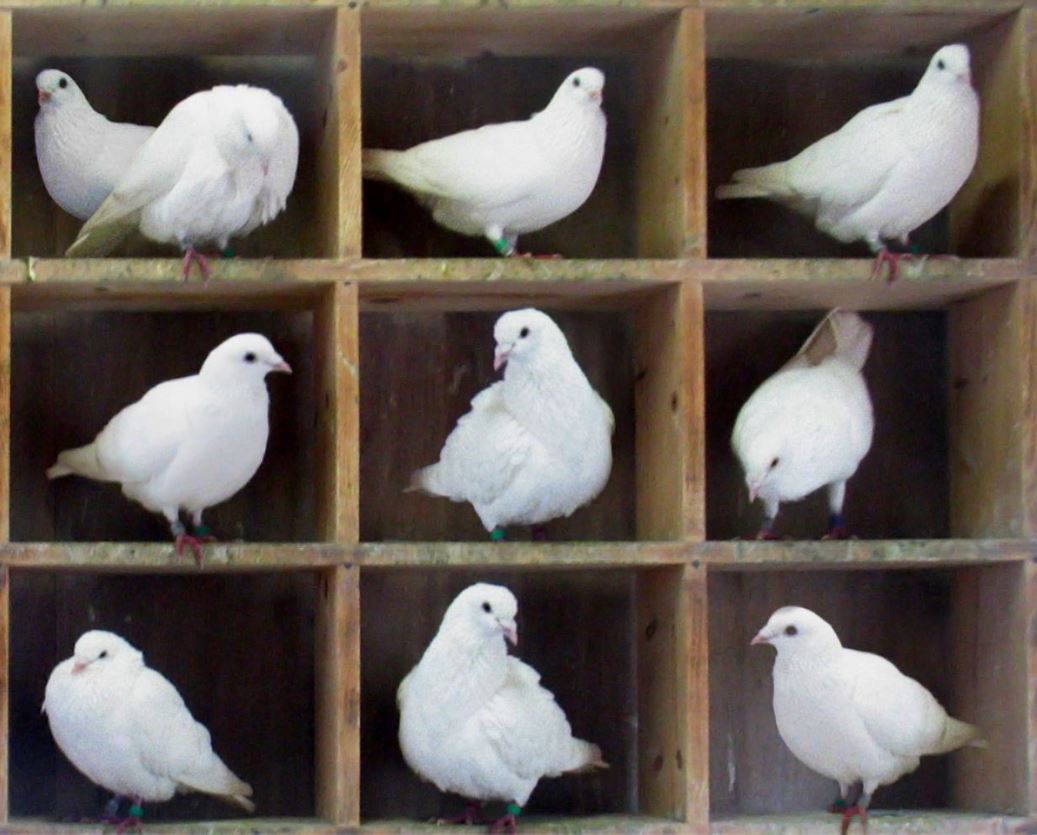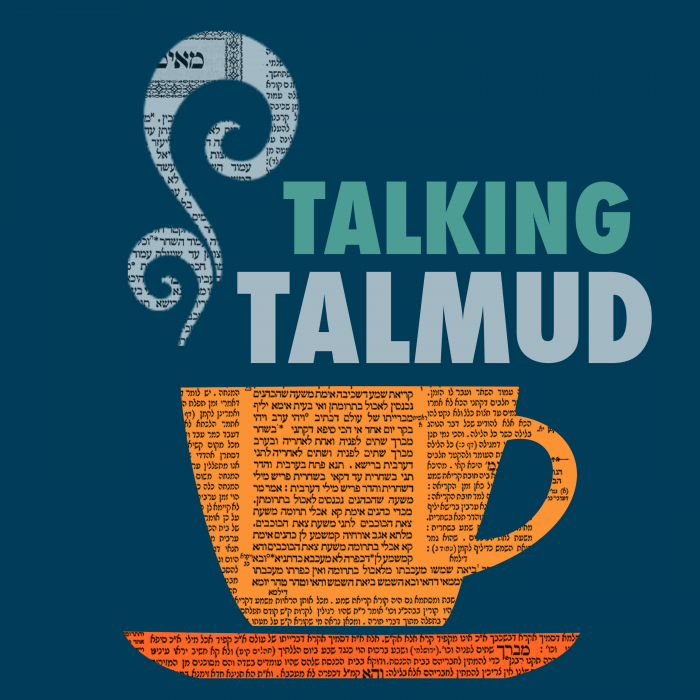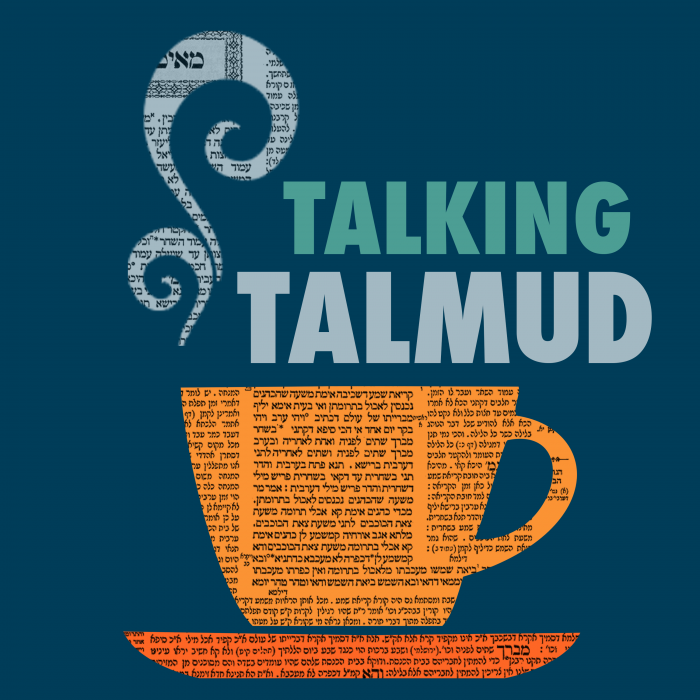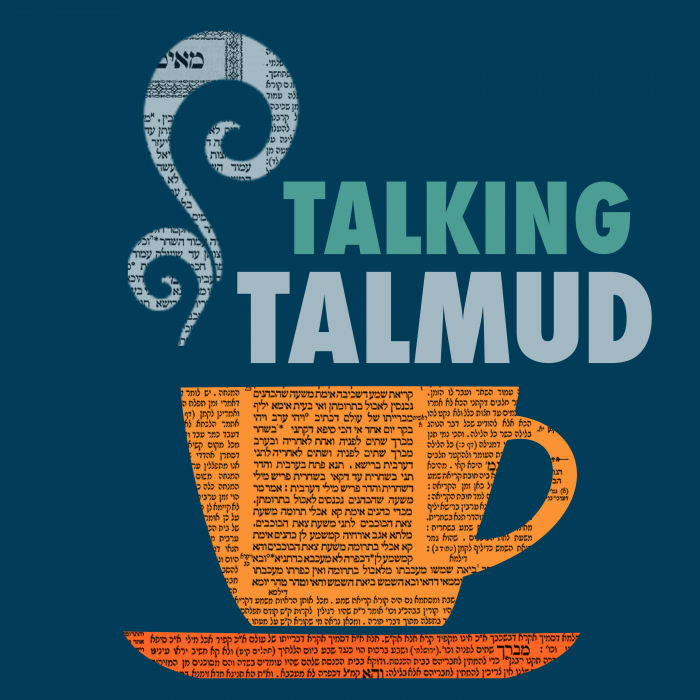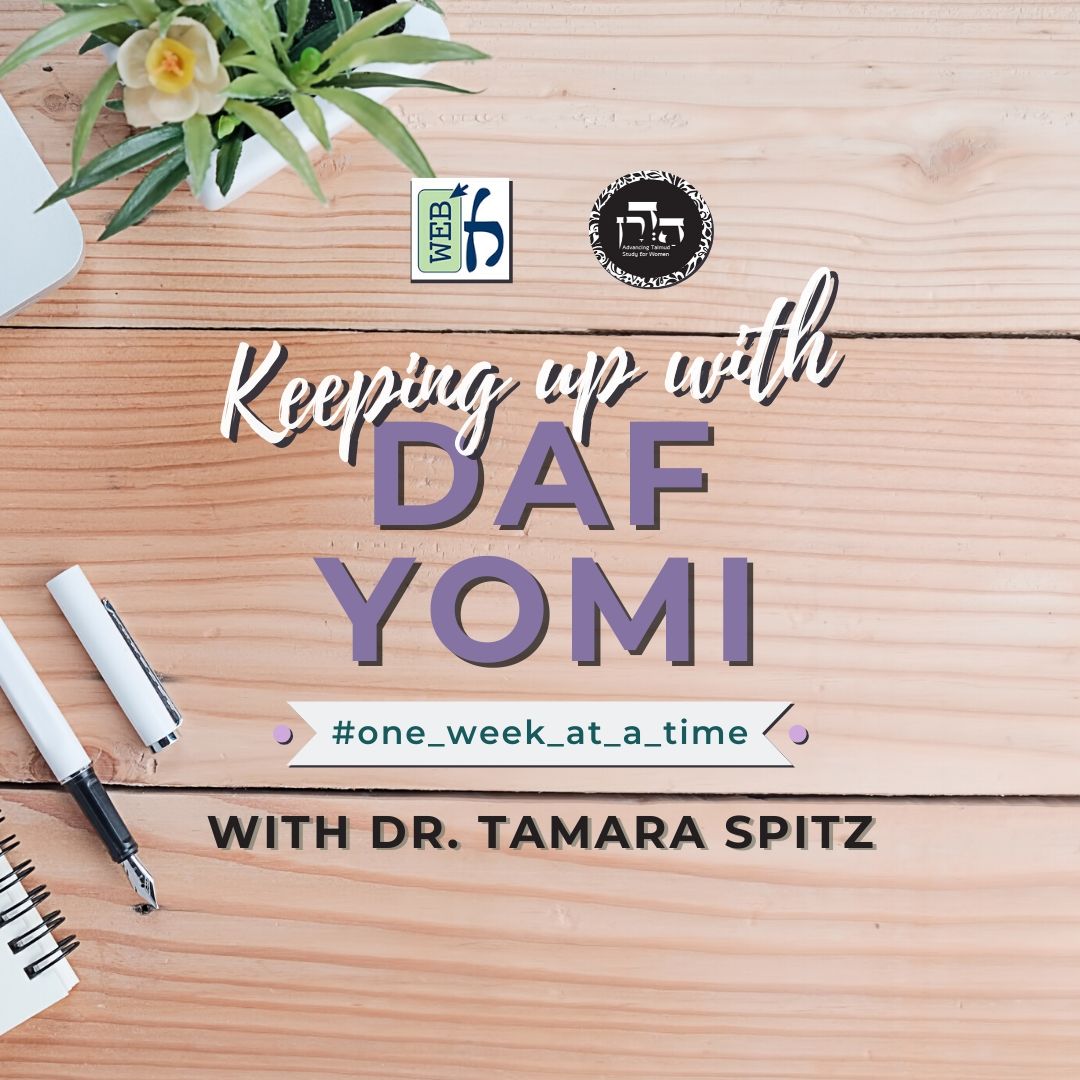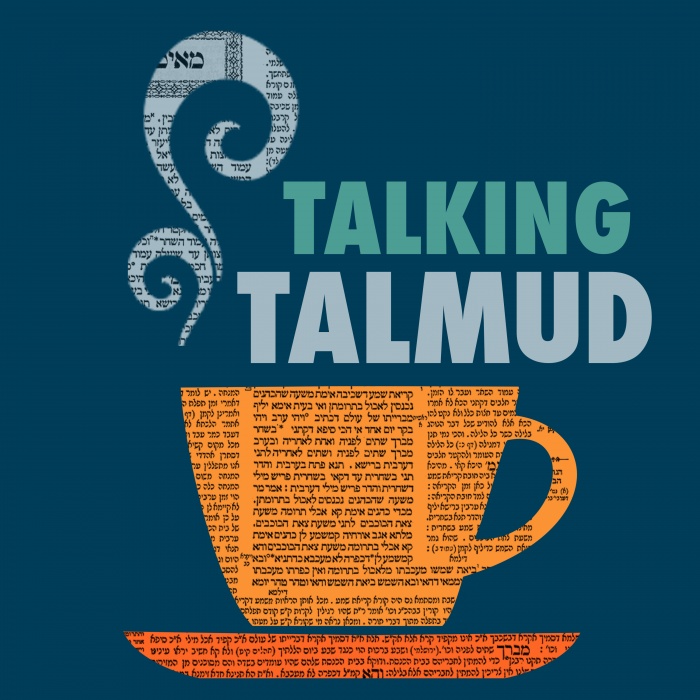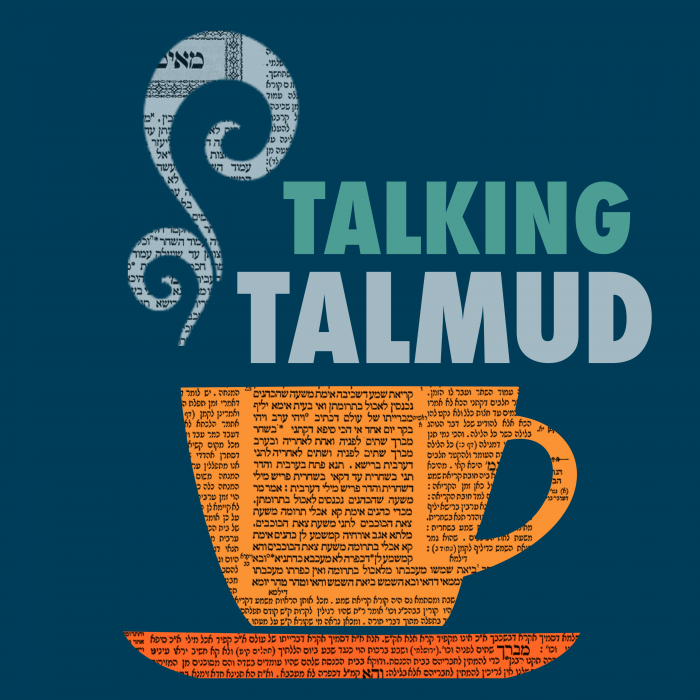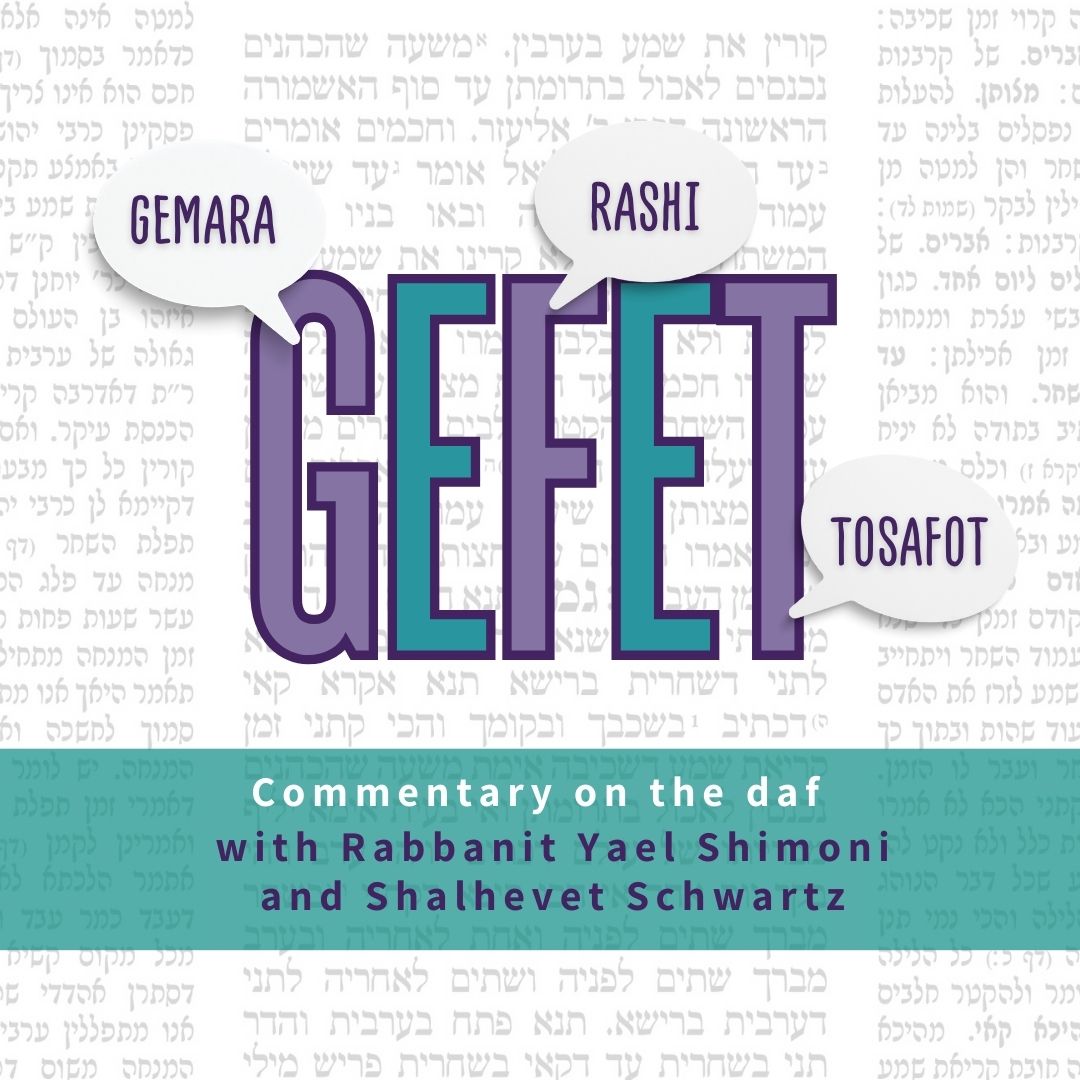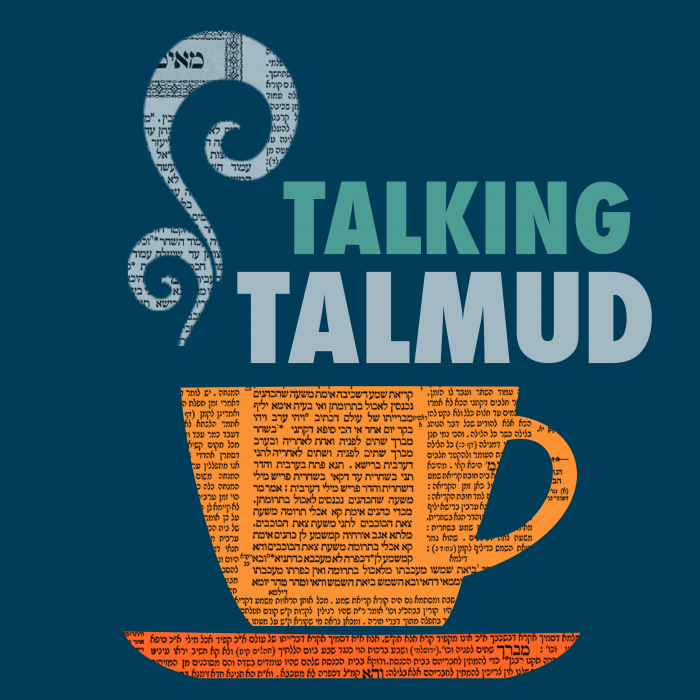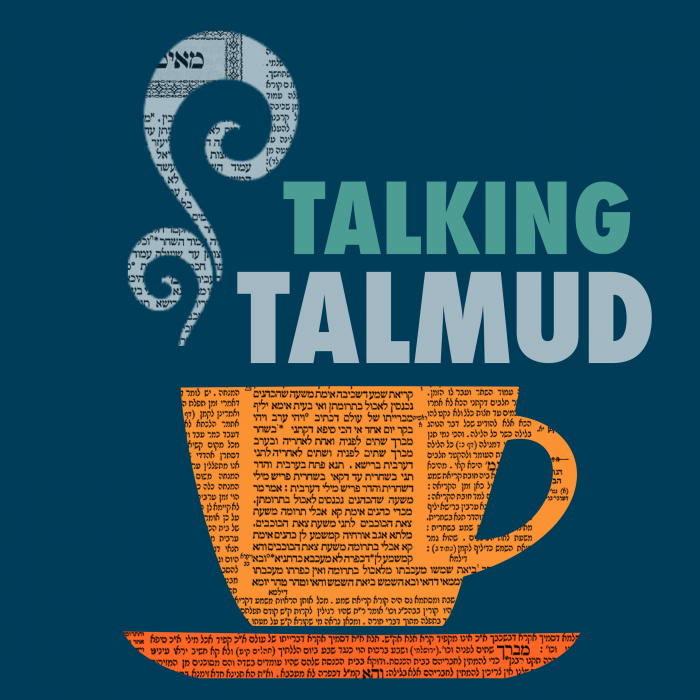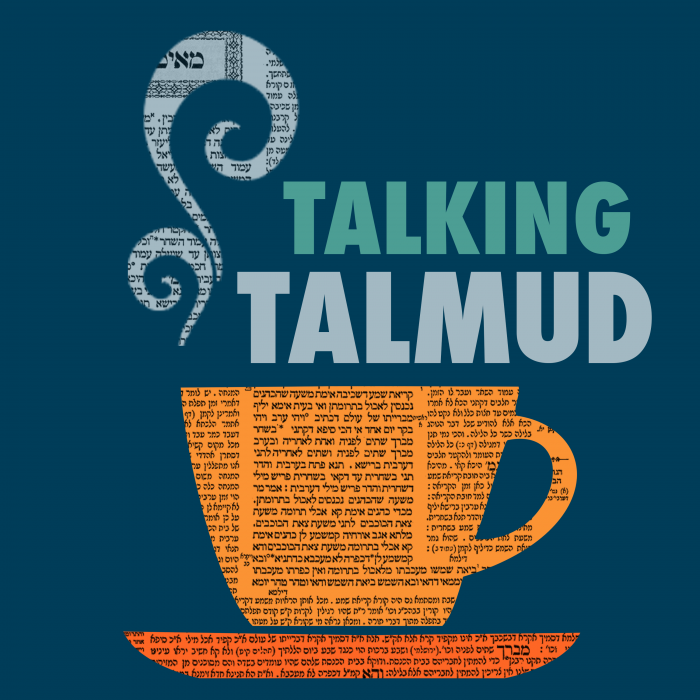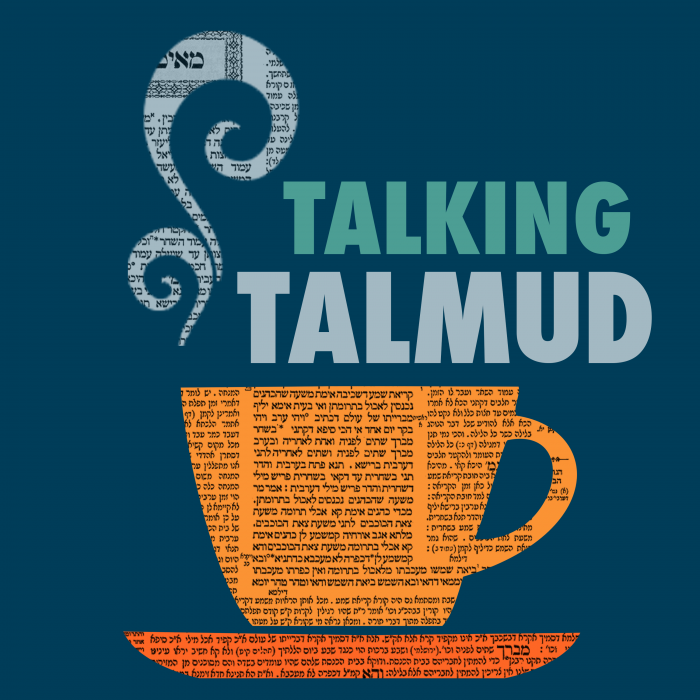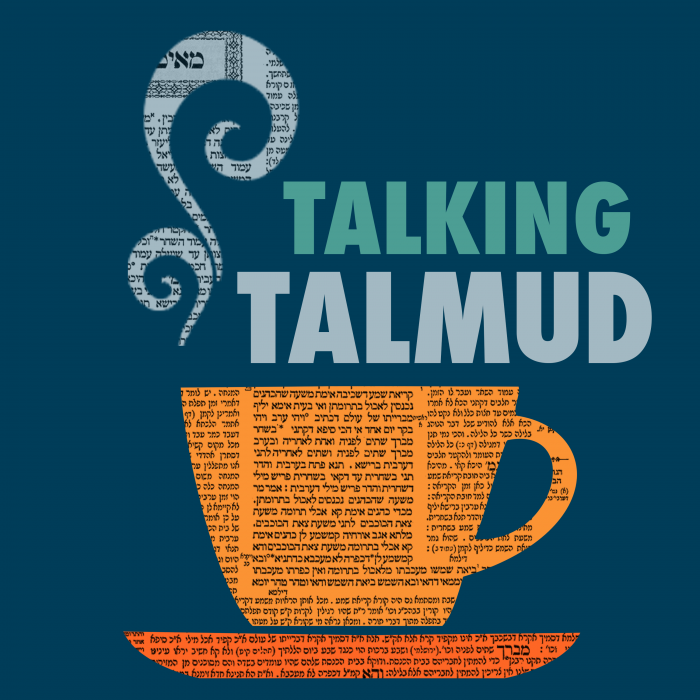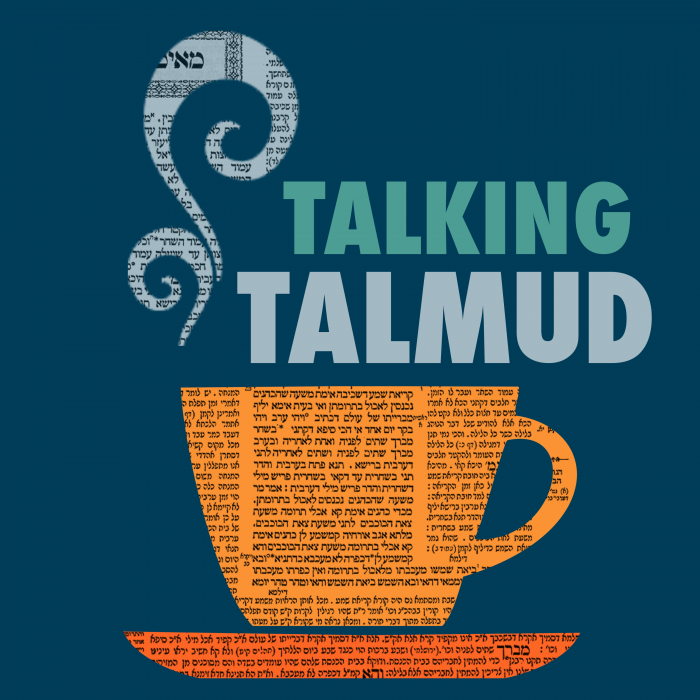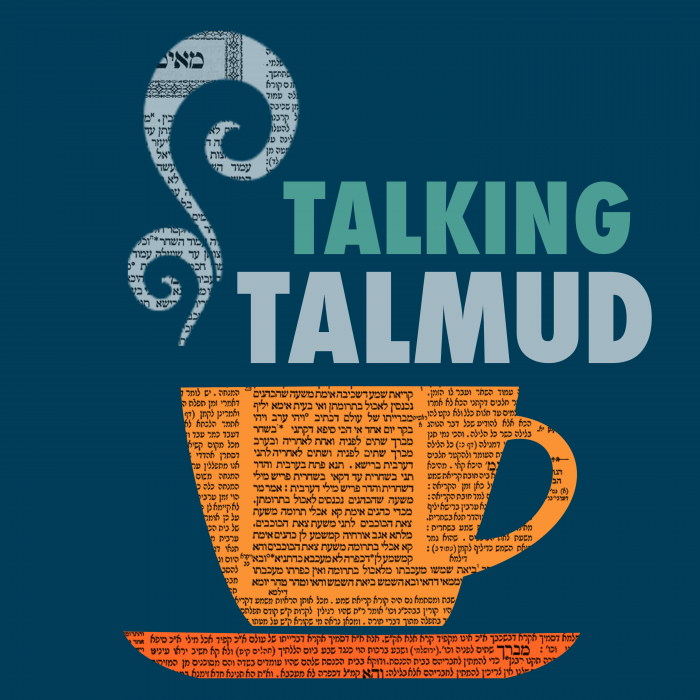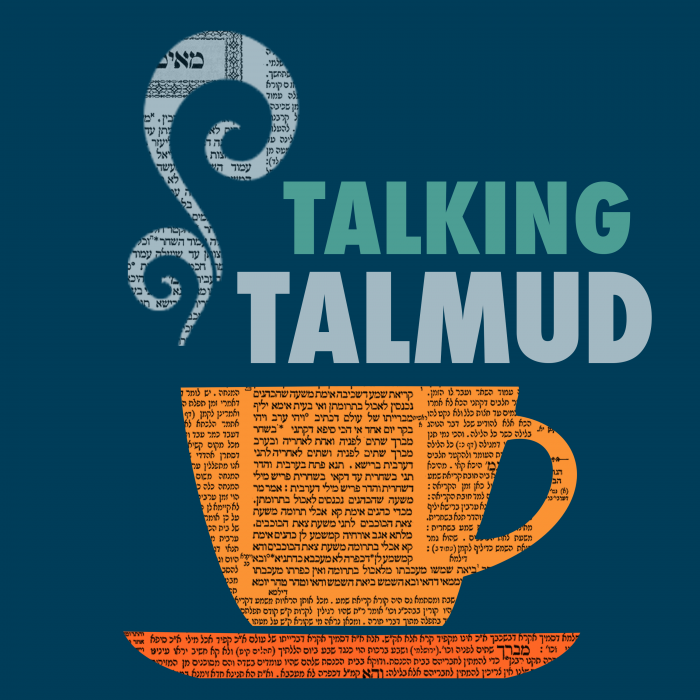Who played musical instruments in the Temple – why? Was the main “shir” the singing or the musical instruments? What is the source for singing while bringing the sacrifices? It is a critical element of the sacrificial process? With which sacrifices did they sing?
This month’s learning is dedicated to the refuah shleima of our dear friend, Phyllis Hecht, גיטל פעשא בת מאשה רחל by all her many friends who love and admire her. Phyllis’ emuna, strength, and positivity are an inspiration.
Want to dedicate learning? Get started here:


Today’s daily daf tools:
This month’s learning is dedicated to the refuah shleima of our dear friend, Phyllis Hecht, גיטל פעשא בת מאשה רחל by all her many friends who love and admire her. Phyllis’ emuna, strength, and positivity are an inspiration.
Today’s daily daf tools:
Delve Deeper
Broaden your understanding of the topics on this daf with classes and podcasts from top women Talmud scholars.
New to Talmud?
Check out our resources designed to help you navigate a page of Talmud – and study at the pace, level and style that fits you.
The Hadran Women’s Tapestry
Meet the diverse women learning Gemara at Hadran and hear their stories.
Arakhin 11
עֲשָׂרָה נְקָבִים הָיוּ בָּהּ, כׇּל אֶחָד וְאֶחָד מוֹצִיא עֲשָׂרָה מִינֵי זֶמֶר, נִמְצֵאת כּוּלָּהּ מוֹצִיאָה מֵאָה מִינֵי זֶמֶר. בְּמַתְנִיתָא תָּנָא: הִיא אַמָּה וּגְבוֹהָ אַמָּה, וְקַתָּא יוֹצָא הֵימֶנָּה, וַעֲשָׂרָה נְקָבִים הָיוּ בָּהּ, כׇּל אֶחָד מוֹצִיא מֵאָה מִינֵי זֶמֶר, נִמְצֵאת כּוּלָּהּ מוֹצִיאָה אֶלֶף מִינֵי זֶמֶר. אָמַר רַב נַחְמָן בַּר יִצְחָק: וְסִימָנָיךְ מַתְנִיתָא גּוּזְמָא.
There were ten holes in it and each and every one would emit ten types of tone. It therefore emerges that the entire instrument emitted one hundred types of tone. It was taught in a baraita: The magreifa was one cubit wide and one cubit tall, and a handle protruded from it. It was hollow and there were ten holes in it and each one would produce one hundred types of tone. It therefore emerges that that the entire instrument emitted one thousand types of tone. Rav Naḥman bar Yitzḥak said: And your mnemonic to remember which of these two statements was said by Shmuel and which was taught in a baraita is that the baraita expresses itself with exaggeration, as it is common for baraitot to exaggerate numbers.
וְעַבְדֵי כֹהֲנִים הָיוּ כּוּ׳. לֵימָא בְּהָא קָמִיפַּלְגִי, דְּמַאן דְּאָמַר עֲבָדִים הָיוּ קָסָבַר: עִיקַּר שִׁירָה בַּפֶּה, וּכְלִי לְבַסּוֹמֵי קָלָא הוּא דַּעֲבִידָא, וּמַאן דְּאָמַר לְוִיִּם הָיוּ קָסָבַר: עִיקַּר שִׁירָה בִּכְלִי!
§ The mishna teaches that the Temple musicians were slaves of priests according to Rabbi Meir, whereas according to Rabbi Yosei they were Israelites of pure lineage, and according to Rabbi Ḥanina ben Antigonus they were Levites. The Gemara suggests: Let us say that they disagree about this; that the one who says they were slaves holds that the primary component of song in the Temple service is singing with the mouth, and the instrumental music was performed merely to sweeten the sound of the singing. Since the instrumental music is mere accompaniment, it could be performed by slaves. And the one who says that the musicians were Levites holds that the primary component of song in the Temple service is the music played with instruments. Therefore, the musicians had to be Levites, who were tasked with the song that was part of the Temple service.
וְתִסְבְּרָא? רַבִּי יוֹסֵי מַאי קָסָבַר? אִי קָסָבַר: עִיקַּר שִׁירָה בַּפֶּה — עֲבָדִים סַגִּיא, אִי קָסָבַר: עִיקַּר שִׁירָה בִּכְלִי — לְוִיִּם בָּעֵינַן!
The Gemara responds: And can you understand the disagreement in this manner? According to this suggestion, what does Rabbi Yosei, who says that the musicians were Israelites of pure lineage, hold? If he holds that the primary component of song in the Temple service is singing with the mouth, then it should be sufficient if slaves play the instruments. Why would he require Israelites of pure lineage? And if he holds that the primary component of song in the Temple service is the music played with instruments, we should require Levites to play the instruments.
לְעוֹלָם קָסָבַר: עִיקַּר שִׁירָה בַּפֶּה, וְהָכָא בְּמַעֲלִין מִדּוּכָן לְיוּחֲסִין וּלְמַעַשְׂרוֹת קָמִיפַּלְגִי.
The Gemara responds: Actually, Rabbi Yosei holds that the primary component of song in the Temple service is singing with the mouth. And here, the tanna’im disagree about whether the musicians in the Temple may be elevated from the musical platform to the presumptive status of pure lineage with regard to marriage and eligibility to receive Levitical tithes.
מַאן דְּאָמַר עֲבָדִים הָיוּ, קָסָבַר: אֵין מַעֲלִין מִדּוּכָן לֹא לְיוּחֲסִין וְלֹא לְמַעַשְׂרוֹת. מַאן דְּאָמַר לְוִיִּם הָיוּ, קָסָבַר: מַעֲלִין מִדּוּכָן בֵּין לְיוּחֲסִין בֵּין לְמַעַשְׂרוֹת. וּלְמַאן דְּאָמַר יִשְׂרְאֵלִים הָיוּ, קָסָבַר: מַעֲלִין מִדּוּכָן לְיוּחֲסִין וְלֹא לְמַעַשְׂרוֹת.
The one who says that the musicians were slaves holds that people cannot be elevated from the Temple musical platform to the presumptive status of pure lineage with regard to marriage and eligibility to receive tithes. The one who says that the musicians were Levites holds that one elevates from the platform both to the presumptive status of pure lineage and eligibility to receive tithes. And according to the one who says that the musicians were Israelites, he holds that one elevates from the platform to the presumptive status of pure lineage but not with regard to the eligibility to receive tithes.
תָּנוּ רַבָּנַן: הַשִּׁיר מְעַכֵּב אֶת הַקׇּרְבָּן, דִּבְרֵי רַבִּי מֵאִיר; וַחֲכָמִים אוֹמְרִים: אֵינוֹ מְעַכֵּב.
§ The Sages taught in a baraita: The song that the Levites sing while a communal offering is being sacrificed is an indispensable component of the offering, which means that if the Levites did not sing, the offering is invalid. This is the statement of Rabbi Meir. And the Rabbis say: It is not indispensable.
מַאי טַעְמָא דְּרַבִּי מֵאִיר? דְּאָמַר קְרָא: ״וָאֶתְּנָה אֶת הַלְוִיִּם נְתֻנִים לְאַהֲרֹן וּלְבָנָיו מִתּוֹךְ בְּנֵי יִשְׂרָאֵל… וּלְכַפֵּר עַל בְּנֵי יִשְׂרָאֵל״, מָה כַּפָּרָה מְעַכֶּבֶת, אַף שִׁירָה מְעַכֶּבֶת.
The Gemara asks: What is the reasoning of Rabbi Meir, i.e., from where does he derive his opinion? The Gemara answers: It is as the verse states: “And I have given the Levites, they are given to Aaron and to his sons from among the children of Israel, to do the service of the children of Israel in the Tent of Meeting, and to make atonement for the children of Israel” (Numbers 8:19). The verse compares the atonement for the Jewish people, which is caused by the sprinkling of the blood of offerings on the altar, to the service of the Levites, which is their singing. This teaches that just as the atonement caused by the sprinkling of the blood is an indispensable component of the offering, so too the song of the Levites is indispensable.
וְרַבָּנַן? הָהוּא לְאִידַּךְ דְּרַבִּי אֶלְעָזָר, דְּאָמַר רַבִּי אֶלְעָזָר: מָה כַּפָּרָה בַּיּוֹם, אַף שִׁירָה בַּיּוֹם.
The Gemara asks: And what do the Rabbis derive from the comparison in this verse? The Gemara answers: That comparison serves to teach another halakha, which was stated by Rabbi Elazar, as Rabbi Elazar says: Just as the atonement achieved by the sprinkling of the blood must take place during the day, so too the song must be sung during the day.
אָמַר רַב יְהוּדָה אָמַר שְׁמוּאֵל: מִנַּיִן לְעִיקַּר שִׁירָה מִן הַתּוֹרָה? שֶׁנֶּאֱמַר: ״וְשֵׁרֵת בְּשֵׁם ה׳ אֱלֹהָיו״, אֵיזֶהוּ שֵׁירוּת שֶׁבְּשֵׁם? הֱוֵי אוֹמֵר: זֹה שִׁירָה.
Rav Yehuda said that Shmuel said: From where is it derived that the basic requirement to accompany communal offerings with song applies by Torah law? As it is stated with regard to a Levite who serves in the Temple: “Then he shall serve with the name of the Lord his God” (Deuteronomy 18:7). What is this service that is performed with the name of God? You must say that this is the song, in which the Levites mention and praise the name of God.
וְאֵימָא נְשִׂיאוּת כַּפַּיִם! מִדִּכְתִיב: ״לְשָׁרְתוֹ וּלְבָרֵךְ בִּשְׁמוֹ״, מִכְּלָל דְּבִרְכַּת כֹּהֲנִים לָאו שֵׁירוּת הִיא.
The Gemara objects: But you can say that this service with the name of God is referring to the lifting of the hands for the Priestly Benediction, which also includes the mention of the name of God. If so, the verse is referring to priests, not ordinary Levites. The Gemara responds: From the fact that it is written: “At that time the Lord separated the tribe of Levi…to serve Him, and to bless in His name” (Deuteronomy 10:8), it can be derived by inference that the Priestly Benediction is not considered service, as the verse mentions service and the Priestly Benediction as distinct rituals.
רַב מַתְנָה אָמַר מֵהָכָא: ״תַּחַת אֲשֶׁר לֹא עָבַדְתָּ אֶת ה׳ אֱלֹהֶיךָ בְּשִׂמְחָה וּבְטוּב לֵבָב״, אֵיזוֹ הִיא עֲבוֹדָה שֶׁבְּשִׂמְחָה וּבְטוּב לֵבָב? הֱוֵי אוֹמֵר: זֹה שִׁירָה. וְאֵימָא דִּבְרֵי תוֹרָה, דִּכְתִיב: ״פִּקּוּדֵי ה׳ יְשָׁרִים מְשַׂמְּחֵי לֵב״! ״מְשַׂמְּחֵי לֵב״ אִיקְּרִי, ״טוֹב״ לָא אִיקְּרִי.
Rav Mattana said that the source for the requirement to accompany the Temple offerings with song is derived from here: “Because you did not serve the Lord your God with joyfulness, and with goodness of heart” (Deuteronomy 28:47). What is this service of God that is performed with joyfulness and with goodness of heart? You must say that this is song. The Gemara objects: But you can say that this service is studying the words of Torah, as it is written: “The precepts of the Lord are upright, rejoicing the heart” (Psalms 19:9). The Gemara explains: Torah is indeed called a matter that rejoices the heart, but it is not called “goodness.”
וְאֵימָא בִּכּוּרִים, דִּכְתִיב: ״וְשָׂמַחְתָּ בְכׇל הַטּוֹב״! ״טוֹב״ אִיקְּרִי, ״טוּב לֵבָב״ לָא אִיקְּרִי.
The Gemara objects: But you can say that the joyful service of God referred to above is the bringing of the first fruits, as it is written in that context: “And you shall rejoice in all the goodness that the Lord your God has given you” (Deuteronomy 26:11). The Gemara answers: Bringing the first fruits is indeed called goodness, but it is not called something that involves goodness of heart.
אָמַר רַב מַתְנָה: מִנַּיִן לַבִּיכּוּרִים שֶׁטְּעוּנִין שִׁירָה? אָתְיָא ״טוֹב״ ״טוֹב״ מֵהָכָא.
The Gemara discusses a related matter. Rav Mattana says: From where is it derived that bringing the first fruits to the Temple requires the accompaniment of song? The Gemara answers: It is derived from here, i.e., from the requirement to accompany communal offerings with song, by means of a verbal analogy of the word goodness in the verse “And with goodness of heart” and the word goodness in the verse “You shall rejoice in all the goodness.”
אִינִי? וְהָא אָמַר רַבִּי שְׁמוּאֵל בַּר נַחְמָנִי אָמַר רַבִּי יוֹנָתָן: מִנַּיִן שֶׁאֵין אוֹמְרִים שִׁירָה אֶלָּא עַל הַיַּיִן? שֶׁנֶּאֱמַר: ״וַתֹּאמֶר לָהֶם הַגֶּפֶן הֶחֳדַלְתִּי אֶת תִּירוֹשִׁי הַמְשַׂמֵּחַ אֱלֹהִים וַאֲנָשִׁים״, אִם אֲנָשִׁים מְשַׂמֵּחַ, אֱלֹהִים בַּמֶּה מְשַׂמֵּחַ? מִכָּאן שֶׁאֵין אוֹמְרִים שִׁירָה אֶלָּא עַל הַיַּיִן.
The Gemara asks: Is that so? But doesn’t Rabbi Shmuel bar Naḥmani say that Rabbi Yonatan said: From where is it derived that songs of praise in the Temple are recited only over the wine libation accompanying the sacrifice? As it is stated: “And the vine replied: Should I leave my wine, which gladdens God and man, and go and wave above the trees” (Judges 9:13). If it is clear that wine gladdens people, in what way does it gladden God? Rather, derive from here that songs of praise in the Temple are recited only over the wine of libation, and it is this song that gladdens God. This is difficult, as since there is no wine libation associated with the bringing of first fruits, how can it be accompanied by song?
מַשְׁכַּחַתְּ לַהּ, כִּדְתָנֵי רַבִּי יוֹסֵי: ״פְּרִי אַתָּה מֵבִיא, וְאִי אַתָּה מֵבִיא מַשְׁקִין״; הֵבִיא עֲנָבִים וּדְרָכָן, מִנַּיִן? תַּלְמוּד לוֹמַר: ״תָּבִיא״.
The Gemara answers: You can find cases where the first fruits are brought in the form of wine, as Rabbi Yosei teaches: The verse states with regard to the first fruits: “You shall take of the first of all the fruit of the ground, which you shall bring in from your land” (Deuteronomy 26:2). Since the verse mentions “fruit,” you must bring the actual fruit as your first fruits offering, and you may not bring it in the form of beverages. If one brought grapes and he had already pressed them into wine, from where is it derived that he has fulfilled his obligation of offering his first fruits? The verse states: “You shall bring in from your land.” This apparently superfluous phrase comes to teach that if one brings wine for the mitzva of first fruits, he has fulfilled his obligation.
חִזְקִיָּה אָמַר מֵהָכָא: ״וּכְנַנְיָהוּ שַׂר הַלְוִיִּם יָשׂוֹר בַּמַּשָּׂא כִּי מֵבִין הוּא״, אַל תִּיקְרֵי ״יָשׂוֹר״ אֶלָּא ״יָשִׁיר״.
The Gemara presents another source for the requirement that the song of the Levites must accompany the sacrificial service in the Temple. Ḥizkiyya says that this obligation is derived from here: “And Chenaniah, chief of the Levites…he was master of lifting, because he was skillful” (I Chronicles 15:22). Do not read it as “he was master [yasor] of lifting,” but as: He shall sing [yashir] with the lifting of his voice.
בִּלְוָוטֵי אָמַר רַבִּי יוֹחָנָן, מֵהָכָא: ״לַעֲבוֹד עֲבוֹדַת עֲבוֹדָה״, אֵיזֶהוּ עֲבוֹדָה שֶׁצְּרִיכָה עֲבוֹדָה? הֱוֵי אוֹמֵר: זוֹ שִׁירָה.
The Sage named Balvatei said that Rabbi Yoḥanan said that the requirement for the Levites to accompany the Temple offerings with song is derived from here: The verse states with regard to the Levites: “Every one that entered in to do the work of service” (Numbers 4:47). What is work that must be performed in conjunction with another service? You must say that this is song.
רַבִּי יִצְחָק אָמַר מֵהָכָא: ״שְׂאוּ זִמְרָה וּתְנוּ תֹף כִּנּוֹר נָעִים עִם נָבֶל״. רַב נַחְמָן בַּר יִצְחָק אָמַר מֵהָכָא: ״הֵם יִשְׂאוּ קוֹלָם יָרֹנּוּ בִּגְאוֹן ה׳ צָהֲלוּ מִיָּם״.
Rabbi Yitzḥak says that the requirement to accompany the Temple offerings with song is derived from here: “Sing aloud to God…Take up the melody, and sound the timbrel, the sweet harp with the lyre” (Psalms 81:2–3). Rav Naḥman bar Yitzḥak said that the obligation is derived from here: “Those yonder lift up their voice, they sing for joy; for the majesty of the Lord they shout from the sea” (Isaiah 24:14).
וְתַנָּא מַיְיתֵי לַהּ מֵהָכָא: ״וְלִבְנֵי קְהָת לֹא נָתָן כִּי עֲבוֹדַת הַקֹּדֶשׁ עֲלֵיהֶם בַּכָּתֵף יִשָּׂאוּ״, מִמַּשְׁמָע שֶׁנֶּאֱמַר ״בַּכָּתֵף״ אֵינִי יוֹדֵעַ שֶׁ״יִּשְׂאוּ״? מָה תַּלְמוּד לוֹמַר ״יִשָּׂאוּ״? אֵין ״יִשָּׂאוּ״ אֶלָּא לְשׁוֹן שִׁירָה, וְכֵן הוּא אוֹמֵר: ״שְׂאוּ זִמְרָה וּתְנוּ תֹף״, וְאוֹמֵר: ״יִשְּׂאוּ קוֹלָם יָרוֹנּוּ וְגוֹ׳״.
And a tanna cites a derivation for the requirement for the Levites to accompany the Temple offerings with song from here: “But unto the sons of Kohath he gave none, because the service of the holy things belonged to them: They bore them [yisa’u] upon their shoulders” (Numbers 7:9). By inference from that which is stated, “upon their shoulders,” don’t I know that they bore them? Why must the verse state “yisa’u”? The term “yisa’u” is not stated here in its meaning of “they bore them,” but rather as an expression of song. And similarly, the verse states: “Take up [se’u] the melody, and sound the timbrel,” and another verse states: “They lift up [yisu] their voice, they sing for joy.”
חֲנַנְיָא בֶּן אֲחִי רַבִּי יְהוֹשֻׁעַ אָמַר, מֵהָכָא: ״מֹשֶׁה יְדַבֵּר וְהָאֱלֹהִים יַעֲנֶנּוּ בְקוֹל״,
Ḥananya, son of Rabbi Yehoshua’s brother, says that the requirement for the Levites to sing in the Temple is derived from here: “Moses spoke, and God answered him with a voice” (Exodus 19:19).
עַל עִסְקֵי קוֹל. רַב אָשֵׁי אָמַר, מֵהָכָא: ״וַיְהִי כְאֶחָד לַמְחַצְּצרִים וְלַמְשֹׁרְרִים לְהַשְׁמִיעַ קוֹל אֶחָד״.
This indicates that God responded to Moses, who was a Levite, by commanding him about matters pertaining to the voice, i.e., that the Levites must accompany the sacrifices with song. Rav Ashi says that the obligation for the Levites to sing in the Temple is derived from here: “It came to pass, when the trumpeters and singers were as one, to make one sound to be heard in praising and thanking the Lord” (II Chronicles 5:13). This indicates that just as there is a requirement for trumpets to be sounded during the sacrifice of communal offerings (see Numbers 10:10), there is likewise a requirement for the Levites to sing.
רַבִּי יוֹנָתָן אָמַר מֵהָכָא: ״וְלֹא יָמוּתוּ גַם הֵם גַּם אַתֶּם״ — מָה אַתֶּם בַּעֲבוֹדַת מִזְבֵּחַ, אַף הֵם בַּעֲבוֹדַת מִזְבֵּחַ.
Rabbi Yonatan says that the requirement for the Levites to sing in the Temple is derived from here: The Torah commands the priests with regard to the Levites: “They shall not come near the altar, that they die not, neither they nor you” (Numbers 18:3). The verse equates the Levites with the priests, indicating that just as you, the priests, are obligated to perform the service on the altar, so too they, the Levites, are obligated to perform a service pertaining to the altar, i.e., the song that accompanies the offerings.
תַּנְיָא נָמֵי הָכִי: ״וְלֹא יָמוּתוּ גַם הֵם גַּם אַתֶּם״ — אַתֶּם בְּשֶׁלָּהֶם וְהֵם בְּשֶׁלָּכֶם בְּמִיתָה, הֵם בְּשֶׁלָּהֶם אֵינָן בְּמִיתָה אֶלָּא בְּאַזְהָרָה.
A derivation of halakhot based on the comparison between priests and Levites in this verse is also taught in a baraita: It is stated: “That they die not, neither they nor you.” This indicates that if you, the priests, perform their duties, i.e., the Levites’ duties, or they, the Levites, perform yours, e.g., the sacrificial rites, the perpetrator is liable to receive death at the hand of Heaven. But if they, the Levites, perform a function that belongs to a different group of Levites, but is nevertheless a duty of theirs, i.e., the Levites in general, e.g., if Levites assigned to open and close the gates of the Temple decide instead to sing, they are not punished with death; rather, they have merely violated a prohibition.
אָמַר אַבָּיֵי: נְקִיטִינַן, מְשׁוֹרֵר שֶׁשִּׁיעֵר בְּשֶׁל חֲבֵירוֹ בְּמִיתָה, שֶׁנֶּאֱמַר: ״וְהַחֹנִים לִפְנֵי הַמִּשְׁכָּן קֵדְמָה לִפְנֵי אֹהֶל מוֹעֵד וְגוֹ׳ וְהַזָּר הַקָּרֵב יוּמָת״. מַאי זָר? אִילֵּימָא זָר מַמָּשׁ — הָכְתִיב חֲדָא זִימְנָא! אֶלָּא לָאו זָר דְּאוֹתָהּ עֲבוֹדָה.
Abaye said: We hold that a Levite designated to serve as a singer who instead served in another Levite’s position as a gatekeeper is liable to be put to death, as it is stated: “And those that were to pitch tent before the Tabernacle eastward, before the Tent of Meeting toward the sunrising, were Moses and Aaron and his sons, keeping the charge of the Sanctuary, for the charge of the children of Israel; and the stranger that drew near was to be put to death” (Numbers 3:38). What is the meaning of the term “stranger” in this verse? If we say it is referring to an actual stranger, i.e., a non-Levite, isn’t it written already on another occasion that he is liable to be put to death (see Numbers 3:10)? Rather, this is not its meaning; instead, it is referring to one who is a Levite but is a stranger to that service.
מֵיתִיבִי: מְשׁוֹרֵר שֶׁשִּׁיעֵר וּמְשׁוֹעֵר שֶׁשּׁוֹרֵר, אֵינָן בְּמִיתָה אֶלָּא בְּאַזְהָרָה!
The Gemara raises an objection to Abaye’s statement from a baraita: A singer who served as a gatekeeper and a gatekeeper who sang are not punished with death; rather, they have merely violated a prohibition.
תַּנָּאֵי הִיא, דְּתַנְיָא: מַעֲשֶׂה בְּרַבִּי יְהוֹשֻׁעַ בַּר חֲנַנְיָה שֶׁהָלַךְ לְסַיֵּיעַ בְּהַגָּפַת דְּלָתוֹת אֵצֶל רַבִּי יוֹחָנָן בֶּן גּוּדְגְּדָא, אָמַר לוֹ: בְּנִי, חֲזוֹר לַאֲחוֹרֶיךָ, שֶׁאַתָּה מִן הַמְשׁוֹרְרִים וְלֹא מִן הַמְשׁוֹעֲרִים.
The Gemara explains that this matter is a dispute between tanna’im, as it is taught in a baraita: There was an incident involving Rabbi Yehoshua bar Ḥananya, a Levite, who went to Rabbi Yoḥanan ben Gudgeda, also a Levite, in order to assist in closing the doors of the Temple. Rabbi Yoḥanan ben Gudgeda said to him: My son, go back, as you are among the singers and not among the gatekeepers.
מַאי לָאו בְּהָא קָמִיפַּלְגִי, דְּמָר סָבַר: מִיתָה הִיא, וּגְזַרוּ בַּהּ רַבָּנַן, וּמָר סָבַר: אַזְהָרָה הִיא, וְלָא גְּזַרוּ בַּהּ?
The Gemara analyzes the baraita: What, is it not the case that these two Levite Sages disagree about this, that one Sage, Rabbi Yoḥanan ben Gudgeda, holds that if a Levite who is a singer closes the gate by himself, it is a prohibition punishable by death, and therefore the Sages decreed that a Levite who is a singer should not even assist the gatekeepers in closing the gates; and one Sage, Rabbi Yehoshua bar Ḥananya, holds that it is a prohibition that is not punishable by death, and therefore the Sages did not decree that a Levite who is a singer should not assist the gatekeepers in closing the gates?
דְּכוּלֵּי עָלְמָא אַזְהָרָה הִיא, מָר סָבַר: מְסַיֵּיעַ גְּזַרוּ בֵּיהּ רַבָּנַן, וּמָר סָבַר: לָא גְּזַרוּ בֵּיהּ רַבָּנַן.
The Gemara responds: No, that is not necessarily the correct analysis of the baraita. Rather, everyone agrees that one Levite performing another Levite’s task by himself is a prohibition that is not punishable by death. One Sage holds that the Sages nevertheless decreed that a Levite who is a singer should not even assist the gatekeepers, and one Sage holds that the Sages did not decree that a Levite who is a singer should not assist the gatekeepers in closing the gates.
בָּעֵי רַבִּי אָבִין: עוֹלַת נִדְבַת צִיבּוּר טְעוּנָה שִׁירָה אוֹ אֵינָהּ טְעוּנָה שִׁירָה? ״עֹלֹתֵיכֶם״ אָמַר רַחֲמָנָא, אַחַת עוֹלַת חוֹבָה וְאַחַת עוֹלַת נְדָבָה, אוֹ דִלְמָא ״עוֹלוֹתֵיכֶם״ דְּכוּלְּהוּ יִשְׂרָאֵל קָאָמַר רַחֲמָנָא?
§ Rabbi Avin raises a dilemma: Does a communal voluntary burnt offering require an accompanying song or does it not require song? He explains the two sides of the dilemma: The Merciful One states in the Torah: “You shall blow with the trumpets over your burnt offerings” (Numbers 10:10). Does the term “burnt offerings” include both an obligatory burnt offering and a voluntary burnt offering, or perhaps the Merciful One is saying that the trumpets and song must accompany the burnt offerings of the entire Jewish people, i.e., they must be burnt offerings that are an obligation of the people?
תָּא שְׁמַע, וַיֹּאמֶר: ״חִזְקִיָּהוּ לְהַעֲלוֹת הָעוֹלָה עַל הַמִּזְבֵּחַ, וּבְעֵת הֵחֵל הָעוֹלָה הֵחֵל שִׁיר ה׳ וְהַחֲצוֹצְרוֹת עַל יְדֵי כְּלֵי שִׁיר דָּוִד מֶלֶךְ יִשְׂרָאֵל״. הַאי שִׁירָה מַאי עֲבִידְתַּהּ? אִילֵּימָא דְּעוֹלַת חוֹבָה, לְמָה לֵיהּ אִימְּלוֹכֵי? אֶלָּא לָאו דְּעוֹלַת נְדָבָה.
The Gemara suggests: Come and hear a proof from a verse: “And Hezekiah commanded to offer the burnt offering upon the altar, and when the burnt offering began, the song of the Lord began also, and the trumpets, together with the instruments of David king of Israel…And Hezekiah the king and the princes commanded the Levites to sing praises unto the Lord” (II Chronicles 29:27–30). The Gemara analyzes the description of this service: This song, what was its purpose? If we say that it accompanied an obligatory burnt offering that was brought on that day, why did they have to seek authorization from Hezekiah? Why did Hezekiah need to issue a specific command that they should accompany this offering with song? Rather, is it not the case that this song served to accompany the voluntary burnt offering that Hezekiah brought on that day?
אָמַר רַב יוֹסֵף: לֹא, עוֹלַת רֹאשׁ חוֹדֶשׁ הֲוָה, וְקָא מִיבַּעְיָא לְהוּ מִי הוּקְבַּע רֹאשׁ חֹדֶשׁ בִּזְמַנּוֹ דְּלִיקְרַב אוֹ לָא.
Rav Yosef said: No, that day was a New Moon, and it was the additional burnt offering of the New Moon, an obligatory burnt offering, that was accompanied by the song. As for the need for Hezekiah’s approval, the explanation is as follows: It was the thirtieth day following the previous New Moon, and they were asking him if the current New Moon was established in its time, i.e., on that day, so that the burnt offering of the New Moon should be sacrificed, or if the New Moon had not been declared on that day. Hezekiah clarified that the court had declared the New Moon, and therefore they should sacrifice the offering.
אֲמַר לֵיהּ אַבָּיֵי: וּמִי מָצֵית אָמְרַתְּ הָכִי? וְהָכְתִיב ״בַּיּוֹם שִׁשָּׁה עָשָׂר לַחֹדֶשׁ הָרִאשׁוֹן וְגוֹ׳״, ״וַיֹּאמֶר חִזְקִיָּהוּ לְהַעֲלוֹת הָעוֹלָה עַל הַמִּזְבֵּחַ״!
Abaye said to Rav Yosef: And how can you say that that day was the New Moon? Isn’t it written: “On the sixteenth day of the first month” (II Chronicles 29:17), and later, in that context, it states: “And Hezekiah commanded to offer the burnt offering upon the altar”?
אֶלָּא אָמַר רָמֵי בְּרֵיהּ דְּרַב יֵיבָא: כֶּבֶשׂ הַבָּא עִם הָעוֹמֶר קָמִיבַּעְיָא לְהוּ, מִי קָבַע רֹאשׁ חֹדֶשׁ בִּזְמַנּוֹ דְּלִיקְרַיב אוֹ לָא?
Rather, Rami, son of Rav Yeiva, said: The question they were asking Hezekiah referred to the obligatory, communal burnt offering lamb that comes with the omer, i.e., the barley offering brought on the sixteenth of the first month, Nisan. They asked: Was the New Moon of Nisan established in its correct time, which means that it is now in fact the sixteenth of Nisan and the omer offering and the lamb brought with it should be sacrificed, or was it not really the sixteenth of Nisan?
מַתְקֵיף לַהּ רַב אַוְיָא: וְלִיחְזֵי פֶּסַח הֵיכִי עָבֵיד, מַצָּה הֵיכִי אָכֵיל!
Rav Avya objects to this explanation: How is it possible that they were unsure whether it was the sixteenth of Nisan? Let them see how the Paschal offering was performed on the fourteenth of Nisan and how matza was eaten the following night. The day of the sixteenth of Nisan could easily be determined from when those mitzvot were performed.
אֶלָּא אָמַר רַב אָשֵׁי: מִידֵּי דְּהָוֵה אַשְּׁלִיחָא דְצִיבּוּרָא דְּמִמְּלִיךְ. הַשְׁתָּא דְּאָתֵית לְהָכִי, אֲפִילּוּ תֵּימָא עוֹלַת חוֹבָה, מִידֵּי דְּהָוֵה אַשְּׁלִיחָא דְצִיבּוּרָא דְּמִמְּלִיךְ.
Rather, Rav Ashi said: They asked permission from Hezekiah before sacrificing the lamb that comes with the omer offering, just as it is with regard to a prayer leader, who, as a gesture of respect, asks permission from the congregation before leading them in prayer. Likewise, the people asked permission from Hezekiah as a formal gesture of respect, not because they required his advice. The Gemara notes: Now that you have arrived at this explanation, you may even say that it was a common obligatory burnt offering, e.g., the daily offering, and they asked permission of Hezekiah before sacrificing it, just as it is with regard to a prayer leader, who asks permission from the congregation before leading it in prayer.
תָּא שְׁמַע: רַבִּי יוֹסֵי אוֹמֵר: מְגַלְגְּלִין זְכוּת לְיוֹם זַכַּאי, וְחוֹבָה לְיוֹם חַיָּיב.
The Gemara has still not proven whether or not a communal voluntary burnt offering must be accompanied with song. The Gemara suggests: Come and hear a proof from the following baraita. Rabbi Yosei says: A fortunate matter is brought about on an auspicious day, and a deleterious matter on an inauspicious day.
אָמְרוּ: כְּשֶׁחָרַב הַבַּיִת בָּרִאשׁוֹנָה, אוֹתוֹ הַיּוֹם תִּשְׁעָה בְּאָב הָיָה, וּמוֹצָאֵי שַׁבָּת הָיָה, וּמוֹצָאֵי שְׁבִיעִית הָיְתָה, וּמִשְׁמַרְתּוֹ שֶׁל יְהוֹיָרִיב הָיְתָה, וְהָיוּ כֹּהֲנִים וּלְוִיִּם עוֹמְדִים עַל דּוּכָנָן וְאוֹמְרִים שִׁירָה, וּמָה שִׁירָה אָמְרוּ? ״וַיָּשֶׁב עֲלֵיהֶם אֶת אוֹנָם וּבְרָעָתָם יַצְמִיתֵם״, וְלֹא הִסְפִּיקוּ לוֹמַר ״יַצְמִיתֵם ה׳ אֱלֹהֵינוּ״ עַד שֶׁבָּאוּ גּוֹיִם וּכְבָשׁוּם, וְכֵן בַּשְּׁנִיָּה.
As the Sages said: When the Temple was destroyed for the first time, that day was the Ninth of Av, a date on which several calamities had already occurred; and it was the conclusion of Shabbat, i.e., it was on the day after Shabbat, a Sunday; and it was the year after a Sabbatical Year; and it was the week of the priestly watch of Jehoiarib; and the priests and Levites were standing on their platform and singing song. And what song were they singing? They were singing the verse: “And He brought upon them their own iniquity, and He will cut them off in their own evil” (Psalms 94:23). And they did not manage to recite the end of that verse: “The Lord our God will cut them off,” before gentiles came and conquered them. And likewise, the same happened when the Second Temple was destroyed.
הַאי שִׁירָה מַאי עֲבִידְתַּיהּ? אִילֵּימָא דְּעוֹלַת חוֹבָה, מִי הֲוַאי? בְּשִׁבְעָה עָשָׂר בְּתַמּוּז בָּטַל הַתָּמִיד! אֶלָּא לָאו דְּעוֹלַת נְדָבָה.
The Gemara analyzes the baraita: This song, what was its purpose? If we say that it accompanied an obligatory burnt offering, was there any obligatory communal burnt offering sacrificed at that time? The daily offering had already ceased to be sacrificed, due to a lack of animals, on the seventeenth of Tammuz, three weeks before the Ninth of Av. Rather, is it not correct to say that this song accompanied a voluntary burnt offering?
וְתִסְבְּרַאּ?! מַאי שְׁנָא דְּעוֹלַת חוֹבָה דְּלָא הֲוַאי, וּמַאי שְׁנָא דְּעוֹלַת נְדָבָה דַּהֲוַאי? הָא לָא קַשְׁיָא: בֶּן בָּקָר אַקְרַאי בְּעָלְמָא הוּא דְּאִיתְרְמִיא לְהוּ.
The Gemara asks: And can you understand this to be the case? What is different about an obligatory burnt offering, which was not sacrificed at this time because they did not have animals to bring, and what is different about a voluntary burnt offering, that it was sacrificed? Just as there were no animals available for obligatory offerings, there were none available for voluntary burnt offerings either. The Gemara answers: That is not difficult. A young bull, which cannot be sacrificed as the daily offering, for which lambs are required, happened to come into their possession merely by coincidence, and they sacrificed it as a voluntary burnt offering. This indicates that the Levites are required to sing as an accompaniment to the sacrifice of a communal voluntary burnt offering.
אָמַר רָבָא, וְאִיתֵּימָא רַב אָשֵׁי: וְתִסְבְּרָא, שִׁירָה דְּיוֹמֵיהּ ״לַה׳ הָאָרֶץ וּמְלוֹאָהּ״, וַיָּשֶׁב עֲלֵיהֶם אֶת אוֹנָם — בְּשִׁיר דְּאַרְבְּעָה בְּשַׁבָּת הוּא! אֶלָּא אִילְיָיא בְּעָלְמָא הוּא דִּנְפַל לְהוּ בְּפוּמַּיְיהוּ.
Rava said, and some say Rav Ashi said: And how can you understand the description of the destruction cited in the baraita? The song of the day for Sunday, which is when the baraita says that the Temple was destroyed, is the psalm that begins: “The earth is the Lord’s, and the fullness thereof” (Psalms 24:1). And yet the verse that the baraita says that the Levites were singing, “And He brought upon them their own iniquity,” is in the song for Wednesday, not the song for Sunday. Rather, it was merely a portentous lamentation [eiliyya] that came into their mouths, not an actual song recited over an offering.
וְהָא ״עוֹמְדִין עַל דּוּכָנָן״ קָתָנֵי! כִּדְרֵישׁ לָקִישׁ, דְּאָמַר: אוֹמֵר שֶׁלֹּא עַל הַקׇּרְבָּן. אִי הָכִי, בְּעוֹלַת נְדָבָה נָמֵי לֵימָא? נָפֵיק מִינַּהּ חוּרְבָּא.
The Gemara asks: But isn’t it taught in the baraita that the Levites were standing on their platform near the altar, which is where they stood when they sang to accompany offerings? The Gemara answers: This can be explained in accordance with the opinion of Reish Lakish, who says: The Levites are permitted to recite songs on the platform even when it is not for an offering. The Gemara asks: If so, if the Levites may recite songs on the platform at will, let them also recite a song for a voluntary burnt offering, even if it is not required. The Gemara answers: That could result in a mishap, as the Levites might assume that just as singing for a voluntary burnt offering is optional, so too singing for an obligatory burnt offering is also optional.
מַאי הֲוָה עֲלַהּ? תָּא שְׁמַע, דְּתָנֵי רַב מָרִי בְּרֵיהּ דְּרַב כָּהֲנָא: ״עַל עֹלֹתֵיכֶם וְעַל זִבְחֵי שַׁלְמֵיכֶם״.
The question of whether a song must be recited for a communal voluntary burnt offering has still not been resolved. The Gemara asks: What came of it, i.e., what is the resolution to that question? The Gemara responds: Come and hear a proof, as Rav Mari, son of Rav Kahana, teaches that the verse: “You shall blow with the trumpets over your burnt offerings, and over the sacrifices of your peace offerings” (Numbers 10:10), juxtaposes burnt offerings to peace offerings, which indicates that there is a relevant comparison between them with regard to the sounding of trumpets, and, by extension, to song.
מָה עוֹלָה קוֹדֶשׁ קָדָשִׁים — אַף שְׁלָמִים קוֹדֶשׁ קֳדָשִׁים, וּמָה שְׁלָמִים קָבוּעַ לָהֶם זְמַן — אַף עוֹלָה קָבוּעַ לָהּ זְמַן.
There are two conclusions that are to be drawn from this comparison: Just as the burnt offering is an offering of the most sacred order, so too, the peace offering that must be accompanied by song is one that is an offering of the most sacred order, and the only peace offering of this kind is the lambs that are brought together with the two loaves on Shavuot. And just as this peace offering has a set time when it must be brought, so too, the burnt offering that must be accompanied by song is one that has a set time, which excludes voluntary burnt offerings. Consequently, voluntary burnt offerings are not accompanied by song.


